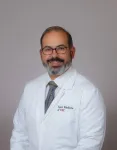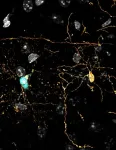(Press-News.org) LOS ANGELES — A clinical trial from Keck Medicine of USC will test the feasibility of treating non-small cell lung cancer with immunotherapy provided at home.
Immunotherapy, medicines that use the body’s immune system to eliminate or control cancer cells, are effective for many cancer patients, but are currently only administered intravenously (into the vein) in a doctor’s office or hospital.
The study will examine if a new formulation of atezolizumab, an immunotherapy approved for treating certain types of non-small cell lung cancer, can instead be safely and effectively administered subcutaneously, meaning it is injected under the patient’s skin, by a nurse at the patient’s home, along with telemedicine appointments and remote monitoring through wearable trackers.
This will be the first clinical trial to test at-home administration of subcutaneous immunotherapy and could potentially lay the foundation for the future of at-home cancer care.
“Many types of drugs are now being delivered subcutaneously at home for several conditions, and we hypothesize that this method of drug delivery can also be successful for cancer patients,” said Jorge Nieva, MD, a medical oncologist and lung cancer specialist with Keck Medicine, a member of USC Norris Comprehensive Cancer Center and lead investigator of the clinical trial. “Additionally, since COVID-19, we’ve learned that physicians have the digital tools to provide patients with excellent remote care.”
The benefits of at-home treatment
Lung cancer is the second most diagnosed cancer in the world and the leading cause of cancer deaths for both men and women worldwide. Non-small cell lung cancer accounts for 81% of all lung cancer cases in the United States.
Immunotherapy is a relatively new treatment option that has been approved to treat many cancer types both on its own or in combination with other therapies, such as radiation and chemotherapy.
Nieva believes that moving immunotherapy from a medical setting to the home will benefit patients. Patients will save time and energy traveling to a clinic or doctor’s office, which can be especially difficult for those who are very sick, and they may feel more relaxed in their own homes. This could also potentially expand access to cancer treatment to patients who live in more remote areas or lack reliable access to transportation.
Delivering the drug under the skin rather than through an intravenous line (IV) has advantages as well.
“The procedure is easier and faster to administer and less likely to cause infection or complications, and patients avoid the potential discomfort of being stuck with a needle several times in the attempt to find a suitable vein for the IV,” said Nieva.
Nieva was motivated to research at-home cancer treatments during the COVID-19 pandemic when a patient who was afraid of catching the virus died after he stopped going into the hospital for his cancer treatments.
“I realized we had to change the delivery of cancer care,” said Nieva.
Clinical trial will use an immunotherapy consisting of monoclonal antibodies
The drug used in the clinical trial, atezolizumab, consists of a monoclonal antibody, a man-made protein that triggers the immune system to attack cancer cells. It was approved by the Food and Drug Administration in 2016 for late-stage lung cancer and more recently in 2021, for early stage, non-small cell lung cancer.
Investigators aim to enroll 37 patients with non-small cell lung cancer who are deemed eligible to receive immunotherapy as treatment. Patients will receive treatments administered by a nurse who will visit their home every three weeks for one to two years.
Additionally, Nieva and his colleagues will use the latest digital tools to track patients’ vital signs, physical activity and other markers of health remotely and monitor patients with telehealth visits.
The study will not only examine the feasibility of home administration of the medication, but how well patients comply with the program and how satisfied they are with being treated remotely and through telehealth appointments.
Nivea hopes that the clinical trial will not only benefit patients with non-small cell lung cancer, but other cancer patients as well.
“Increasingly, health care is moving in a direction where instead of patients going to us for services, we are able to come to them, increasing access to care and potentially addressing existing health care disparities,” said Nieva. “If this study can show that at-home cancer immunotherapy is safe and feasible for non-small cell lung cancer, it will open the door for more home treatments for other types of cancers in the future.”
To learn more about the criteria to participate in the clinical trial, click here. Those who are interested in participating in the trial may contact Sandy Tran at (323) 865-3935 or sandy.tran@med.usc.edu.
The sponsors of the clinical trial are the National Cancer Institute (NCI), grant number ML43326, and Genentech, Inc.
###
For more information about Keck Medicine of USC, please visit news.KeckMedicine.org.
END
Study explores the future of at-home cancer treatment
A first-of-its-kind clinical trial from Keck Medicine of USC will investigate if immunotherapy administered at home can achieve the same outcomes as in-clinic therapy
2024-03-28
ELSE PRESS RELEASES FROM THIS DATE:
First performance standards published to measure the effectiveness of lifestyle medicine treatments
2024-03-28
An expert panel has published the first performance measures to identify remission and evaluate the effectiveness of lifestyle medicine treatments, which will allow more objective comparisons between lifestyle behavior interventions and other non-lifestyle treatments.
The performance measures are significant because, as interest in the field of lifestyle medicine has grown, it became clear that the lack of standards to document remission or long-term progress following lifestyle medicine treatment was a barrier to the widespread integration of the ...
To keep volunteers, connect them
2024-03-28
At a time when America needs volunteers more than ever, to tackle social problems from homelessness to disaster recovery, fewer people have been volunteering.
The number of volunteers for nonprofit and community-based organizations declined recently for the first time in decades, from 30% of the population in 2019 to 23% in 2021. That’s according to AmeriCorps and the U.S Census Bureau, which have tracked rates of volunteerism since 2002.
New research from Yifan Yu, assistant professor of ...
Suppressing boredom at work hurts future productivity, study shows
2024-03-28
Boredom is more common at work than in any other setting, studies show, and employees are bored at work for more than 10 hours per week on average.
Even astronauts and police officers get bored on the job. No occupation is immune.
Boredom serves an important purpose — it signals the need to stop an action and find an alternative project. But boredom becomes problematic when it’s ignored.
New research from the University of Notre Dame shows that trying to stifle boredom prolongs its effects and that alternating boring and meaningful tasks helps to prevent the effects of one boring task from ...
Older brain cells linger unexpectedly before their death
2024-03-28
For oligodendrocytes—the central nervous system cells critical for brain function—age may not bring wisdom, but it does come with the power to cling to life for much, much longer than scientists knew. That's according to a new study featured on the March 27 cover of the Journal of Neuroscience.
Mature oligodendrocytes took a shocking 45 days to die following a fatal trauma that killed younger cells within the expected 24 hours, Dartmouth researchers report. The findings suggest there's a new pathway for efforts to reverse or prevent the damage that aging and diseases such as multiple sclerosis cause to these important cells.
In the brain, ...
Clear shift in arterial diseases in diabetes
2024-03-28
There has been a redistribution in the risk of arterial disease in type 1 and 2 diabetes. The risks of heart attack and stroke have decreased significantly, while complications in more peripheral vessels have increased in relative importance, according to studies at the University of Gothenburg.
It is well known that type 1 and 2 diabetes increase the risk of heart attack and stroke. Previous research has also identified the clearest cardiometabolic risk factors in this context, such as obesity, lipid disorders, and high blood pressure.
How diabetes and cardiometabolic risk factors affect blood ...
Celebrating half a century of pioneering excellence: EBMT marks its 50th anniversary
2024-03-28
Barcelona, 27 March 2024 – The EBMT proudly commemorates its 50th anniversary, marking five decades of transformative advancements in the field of hematopoietic cell transplantation (HCT) and cellular therapy. More than 5,000 healthcare professionals will gather from the 14th to the 17th of April, 2024, at the Scottish Event Campus in Glasgow for this special edition and they will immerse themselves in cutting-edge scientific content, network with their peers from across the globe, and be part of a community that is driving innovation and change.
In 1974, a small group ...
Ancient DNA reveals the appearance of a 6th century Chinese emperor
2024-03-28
What did an ancient Chinese emperor from 1,500 years ago look like? A team of researchers reconstructed the face of Chinese Emperor Wu of Northern Zhou using DNA extracted from his remains. The study, published March 28 in the journal Current Biology, suggests the emperor’s death at the age of 36 might be linked to a stroke. It also sheds light on the origin and migration patterns of a nomadic empire that once ruled parts of northeastern Asia.
Emperor Wu was a ruler of the Northern Zhou dynasty in ancient China. Under his reign from AD 560 to AD 578, Emperor Wu built a strong military and unified the northern part ...
DNA study IDs descendants of George Washington from unmarked remains, findings to aid service member IDs going back to World War II
2024-03-28
New DNA sequencing technologies have identified the historical remains of George Washington’s grandnephews, Samuel Walter Washington and George Steptoe Washington Jr., and their mother, Lucy Payne Washington, from unmarked, fragmentary bones left at the Harewood family cemetery in Charles Town, West Virginia, in the mid-1800s.
In addition to enabling the remains in question to be reunited and reburied if desired, the researchers plan to apply the validated DNA analysis techniques to their ongoing efforts to identify the remains of service members lost around the world in past conflicts going back to World War II. The findings appear March 28 in the journal iScience.
“The ...
Familial Alzheimer’s disease transferred via bone marrow transplant in mice
2024-03-28
Familial Alzheimer’s disease can be transferred via bone marrow transplant, researchers show March 28 in the journal Stem Cell Reports. When the team transplanted bone marrow stem cells from mice carrying a hereditary version of Alzheimer’s disease into normal lab mice, the recipients developed Alzheimer’s disease—and at an accelerated rate.
The study highlights the role of amyloid that originates outside of the brain in the development of Alzheimer’s disease, which changes the paradigm of Alzheimer’s from being a disease ...
Perspectives of oncologists on the ethical implications of using AI for cancer care
2024-03-28
About The Study: In this survey study of 204 oncologists, few reported that patients needed to understand artificial intelligence (AI) models, but most agreed that patients should consent to their use, and many tasked patients with choosing between physician- and AI-recommended treatment regimens. These findings suggest that the implementation of AI in oncology must include rigorous assessments of its effect on care decisions as well as decisional responsibility when problems related to AI use arise.
Authors: Gregory A. Abel, M.D., M.P.H., of the Dana-Farber Cancer Institute in Boston, is the corresponding author.
To ...
LAST 30 PRESS RELEASES:
Novel camel antimicrobial peptides show promise against drug-resistant bacteria
Scientists discover why we know when to stop scratching an itch
A hidden reason inner ear cells die – and what it means for preventing hearing loss
Researchers discover how tuberculosis bacteria use a “stealth” mechanism to evade the immune system
New microscopy technique lets scientists see cells in unprecedented detail and color
Sometimes less is more: Scientists rethink how to pack medicine into tiny delivery capsules
Scientists build low-cost microscope to study living cells in zero gravity
The Biophysical Journal names Denis V. Titov the 2025 Paper of the Year-Early Career Investigator awardee
Scientists show how your body senses cold—and why menthol feels cool
Scientists deliver new molecule for getting DNA into cells
Study reveals insights about brain regions linked to OCD, informing potential treatments
Does ocean saltiness influence El Niño?
2026 Young Investigators: ONR celebrates new talent tackling warfighter challenges
Genetics help explain who gets the ‘telltale tingle’ from music, art and literature
Many Americans misunderstand medical aid in dying laws
Researchers publish landmark infectious disease study in ‘Science’
New NSF award supports innovative role-playing game approach to strengthening research security in academia
Kumar named to ACMA Emerging Leaders Program for 2026
AI language models could transform aquatic environmental risk assessment
New isotope tools reveal hidden pathways reshaping the global nitrogen cycle
Study reveals how antibiotic structure controls removal from water using biochar
Why chronic pain lasts longer in women: Immune cells offer clues
Toxic exposure creates epigenetic disease risk over 20 generations
More time spent on social media linked to steroid use intentions among boys and men
New study suggests a “kick it while it’s down” approach to cancer treatment could improve cure rates
Milken Institute, Ann Theodore Foundation launch new grant to support clinical trial for potential sarcoidosis treatment
New strategies boost effectiveness of CAR-NK therapy against cancer
Study: Adolescent cannabis use linked to doubling risk of psychotic and bipolar disorders
Invisible harms: drug-related deaths spike after hurricanes and tropical storms
Adolescent cannabis use and risk of psychotic, bipolar, depressive, and anxiety disorders
[Press-News.org] Study explores the future of at-home cancer treatmentA first-of-its-kind clinical trial from Keck Medicine of USC will investigate if immunotherapy administered at home can achieve the same outcomes as in-clinic therapy




